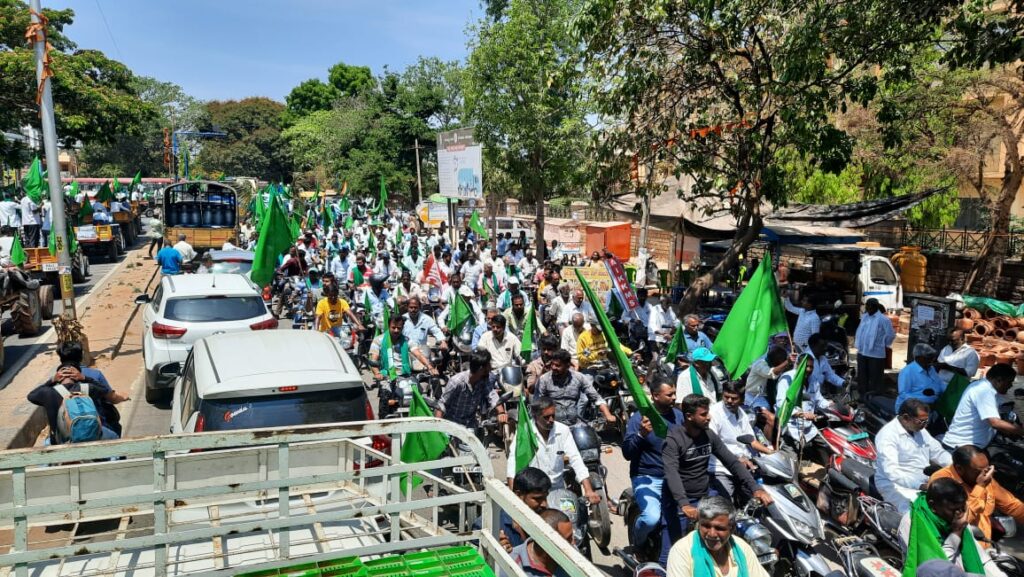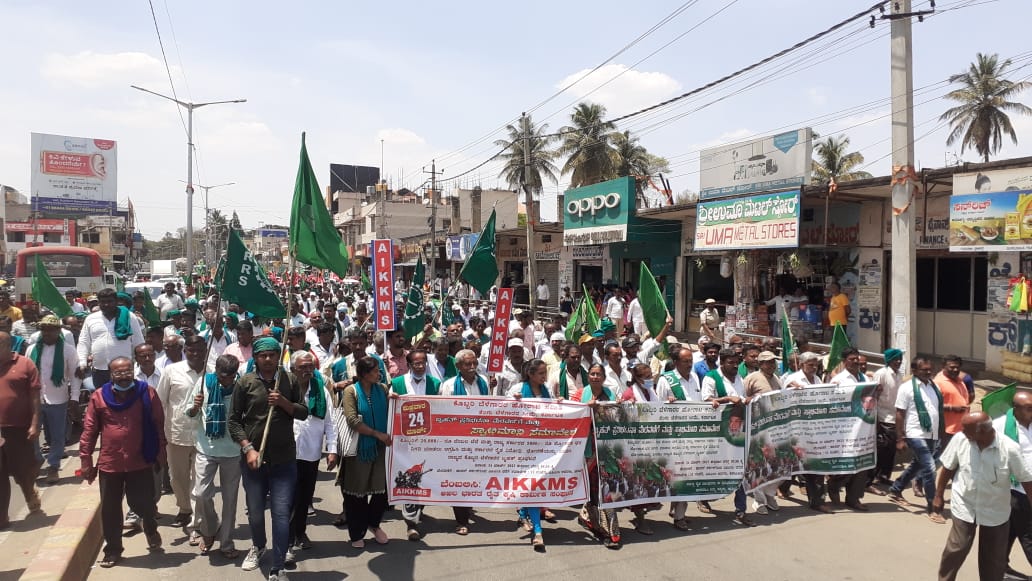Over the past twelve months, coconut farmers in the states of Karnataka, Kerala, and Tamil Nadu have witnessed a drastic decline in the prices of raw coconuts and dried kernels (Copra).
They claim that the support price for ball copra doesn’t even cover the cultivation costs. In the last six months alone, the prices of dried kernels have dropped by nearly 40%, plunging the farming community into a deep crisis of financial losses and mounting debt.
Farmers’ organizations, including the Karnataka Rajya Raitha Sangha (KRRS), have been protesting and urging the government to increase the Minimum Support Price to 50% above the average cost of cultivation. For the 2023 season, the Union Government of India has set the Minimum Support Price for milling copra at Rs 10,860 per quintal (~132 USD per 100 kg) and for ball copra at Rs 11,750 per quintal (~144 USD per 100 kg). However, farmers say this is not enough.
Jayachandra Sharma, a coconut farmer in Tiptur, Karnataka, who is also a member of the Karnataka Rajya Raitha Sangha, explains why the support price is just not enough.
“Unlike the Southeast Asian countries, where coconuts are grown more like a forest crop, the case in India is different. For farmers in those countries, their cost is mainly related only to harvesting because they do very little or no cultivation. Here, we spend a lot on cultivation – labour, irrigation, bore-well, pipes, inputs. We also do 4-5 rounds of cultivation in a year. Even for the coconut to start yielding, it takes five years. So we need to recover all the costs of plantation as well. Then you add the cost of harvesting. Once it’s harvested, loading the harvest, transporting, storing, then a year later we take it out of storage, de-husk, pack and deliver it to the nearest mandi – all of this is a cost borne by the farmer. So if you sum all this up, our cost of cultivation is often very high. However, the support price that is set doesn’t scientifically calculate the cost a farmer incurs, and hence it’s set at a very low level. The Karnataka State government has recommended a price of INR 16,730 as the support price, but the Commission responsible for setting support prices has set it at merely 11,750 – it’s completely unviable for the farmer.”
Raw Coconuts and Tender Coconuts are sold in open wholesale markets, whereas dried kernels – also known as copra – are predominantly sold at the Agricultural Produce & Livestock Market Committee (APMC) markets – also referred to as mandis. The oil extracted from these dried kernels is rich in lauric acid, making it an important commodity in the preparation of lauryl alcohol, soaps, fatty acids, cosmetics, etc.
Jayachandra blames the low minimum support price of ball copra on the unscientific methods of calculation.
“The commission is more interested in keeping the consumers and the markets happy. So they are reluctant to raise the MSP.”
“It’s not just that. The liberalization of the Agricultural markets – APMCs or Mandis – is also a contributing factor. At the APMC yard, the sellers have better bargaining power over the buyers, and the buyers are forced to play by the rules of the yard. After liberalization, private buyers can also operate outside these regulated markets. They approach farmers at the farm-gate, where the collective bargaining power of farmers is lost, and they are desperate to sell even at a lower price, effectively pushing down the price.”
KRRS had steadfastly opposed the amendments to the laws regulating the agricultural markets, but the government went ahead with them. After the historic farm protest in 2021, farm organizations in India demanded that the Minimum Support Price be made a legal guarantee and that any sale below the MSP be criminalized. However, no progress has been made on that front.
“The government claims that there is not sufficient production of oilseeds in India, and that becomes the justification for imports. The data around production is gathered at the APMC, but if sales are happening outside APMC, how reliable is the government data, in the first place?”
That brings us to the second problem: duty-free imports.
Jayachandra adds, “India is a big importer of Palm Oil. At this point, we are not charging any import duty on palm oil, which means the imported palm oil is selling at a much lower price in the market. It’s this which is primarily causing the crash. The domestic industry is now relying more on cheaper palm oil than coconut oil. We have been demanding that the import duty be set at 30% so that coconut farmers do not have to suffer the impact of cheap palm oil.”
India mainly buys palm oil from Indonesia, Malaysia, and Thailand, while it imports soy oil and sunflower oil from Argentina, Brazil, Russia, and Ukraine. India’s palm oil imports in June increased by 49% from the previous month to their highest level in three months. Additionally, soy oil imports in June surged by 35% compared to the previous month.
Oddly enough, despite being the leading global supplier of Coconuts, India has also been importing coconut powder from Indonesia, Malaysia, Sri Lanka, and other foreign countries for the last few years. Cheap imports of desiccated powder from Sri Lanka are affecting the domestic industry. Consignments from the island nation come in as animal feed and with low-fat content.
The government claims that per capita edible oil consumption in India has gone up, and hence they are forced to import. Jayachandra alleges that there is more to it than meets the eye, and the interests of a few giant and influential agribusiness corporations are also playing a part in keeping the import duty low. He cites the example of Singapore-based palm-oil giant Wilmar, which partnered with the Indian conglomerate Adani group in 1999 for the purposes of importing, refining, processing, distributing, and marketing palm-oil products in India. Adani Wilmar in India has continued to import and refine ever-increasing quantities of crude palm oil from Indonesia and Malaysia for processing in its network of refineries. A report reveals that ‘by 2014 the Mundra refinery was processing over 340 tonnes of palm oil a day, making it the biggest such refinery in India; and by 2015 Adani Wilmar had 17 refineries operating nationwide. According to company reports, Adani Wilmar is now India’s biggest refiner of edible oils with the country’s biggest-selling brands of cooking oil.’ In August 2021, India’s government announced a scheme to increase dramatically the area of India producing palm oil, a product used in the manufacture of hundreds of consumer goods. It’s part of a $US 1.5-billion push for self-sufficiency in edible oils. The focus is to develop palm oil plantations in the northeastern states and Andaman and Nicobar Islands of India.
“India is a huge market for Palm Oil businesses because of the push back they have received from the US and Europe, owing to health concerns linked to palm kernel oil.” Jayachandra adds.
Nearly 12 million people in India rely on coconut farming, with approximately 90 percent of the total production coming from the southern states of Kerala, Tamil Nadu, Karnataka, and Andhra Pradesh.
Earlier this month, Newsclick reported that farmers in Tamil Nadu protested in more than 50 locations on July 12. They broke coconuts as a symbolic gesture and urged state ministers to raise their voices in Parliament to address the decline in coconut prices. The protesters demanded that the National Government directly procure coconuts from farmers and provide payment within seven days of purchase. Additionally, they called for a ban on the import of palm oil and sunflower oil.
The protesting farmers are demanding universal crop insurance and the inclusion of coconut oil in the Public Distribution System.

Jayachandra explains, “Farmers’ organizations have been calling for the inclusion of Coconut Oil in the Public Distribution System since 2009, but unfortunately, no progress has been made on that front. Strangely enough, Palm Oil, which isn’t even produced here, is part of the distribution system.”
India’s Public Distribution System is a critical pillar that aims to ensure food security for millions of citizens living in poverty. The government procures commodities from the market and sells them at subsidized rates through government-run retail shops that are part of this system.
Moreover, coconut farmers in Kerala are facing a severe financial crisis due to the sharp decline in prices of raw coconuts in the open market, coupled with a lack of sufficient procurement centers in villages.
All of this is happening against the backdrop of crop losses caused by extreme weather events and diseases. “Pest attacks and diseases are recurring issues for coconut farmers across India, including black-headed caterpillars, mushroom disease, stem-bleeding, and others. Heavy rains also bring pests,” Jayachandra explains.
He emphasizes the need for a comprehensive plan to tackle these problems, which are currently hindered by inter-departmental issues and a lack of coordination between the State and Union government. Jayachandra complains that often a prescribed package of practices is imposed on farmers, forcing them to spend from their own pockets to implement it.
So, aside from all the other issues, the price crash is a double whammy for coconut farmers.
According to the farmers, there are some immediate steps the government can take.
“Stop the imports or impose a 30% duty on imports, increase the MSP, and also bring Coconut oil under PDS (Public Distribution System).”
In addition, there is potential to develop a market for by-products like husk, shell, tree, and leaves. “The price for husk has fallen by 70% in the last year. Currently, throwing away husk is costlier than selling it. Prices for shell have also dropped. So, everybody in this chain is affected – farmers, processing mills – all of them. We used to export fiber to China for land stabilization use, but after border tensions, that market is also down, and we have not found a way to create a domestic market for fiber,” Jayachandra adds.
“The government has been talking about creating Farmer Producer Organizations – FPOs to sell all these products. But without developing a market, how will we sell? Most FPOs end up selling company products to farmers, rather than finding us markets!” he rues.
KRRS protests have forced the Karnataka State government to at least acknowledge the problem, and nearly two hours of debate happened inside the State legislature. The movement is demanding that the State provides an additional support of INR 5000 to address the gap in the MSP. So far, the State has allotted only INR 1250 as additional support. They are now pressuring the state to push for a national body to scientifically assess the reasons for the price crash.
KRRS is also planning to host an International Seminar in September in Karnataka with participation from farmers, state officials, and industry representatives. The aim is to have a public debate that could bring more attention to this sector and seek permanent solutions.
All images and videos provided by KRRS

